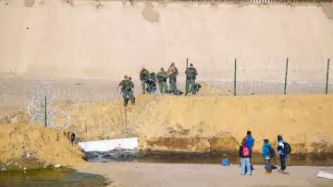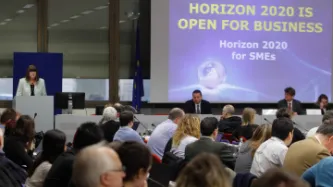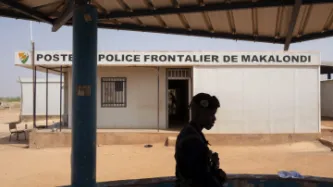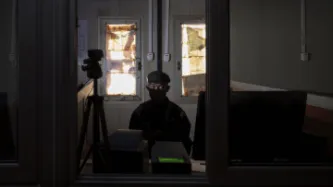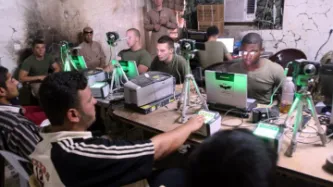Search
Content type: News & Analysis
An excerpt of this piece was first published in June 2020 in Adbusters, an international not-for-profit magazine produced by a global collective of artists and activists who want to 'shake up complacent consumer culture'.
Big oil. Big tobacco. Big pharma. How did we let ‘big tech’ happen? You would have thought humanity would learn its lesson. That nothing good comes of the mass accumulation and concentration of power into the hands of so few.
The internet was meant to be different. No…
Content type: News & Analysis
A new report by the UN Working Group on mercenaries analyses the impact of the use of private military and security services in immigration and border management on the rights of migrants, and highlights the responsibilities of private actors in human rights abuses as well as lack of oversight and, ultimately, of accountability of the system.
Governments worldwide have prioritised an approach to immigration that criminalises the act of migration and focuses on security.
Today, borders are not…
Content type: Explainer
At first glance, infrared temperature checks would appear to provide much-needed reassurance for people concerned about their own health, as well as that of loved ones and colleagues, as the lockdown is lifted. More people are beginning to travel, and are re-entering offices, airports, and other contained public and private spaces. Thermal imaging cameras are presented as an effective way to detect if someone has one of the symptoms of the coronavirus - a temperature.
However, there is little…
Content type: Long Read
What Do We Know?
Palantir & the NHS
What You Don’t Know About Palantir in the UK
Steps We’re Taking
The Way Forward
This article was written by No Tech For Tyrants - an organisation that works on severing links between higher education, violent tech & hostile immigration environments.
Content type: Case Study
Well into the 21st century, Serbia still does not have a strong privacy culture, which has been left in the shadows of past regimes and widespread surveillance. Even today, direct police and security agencies’ access to communications metadata stored by mobile and internet operators makes mass surveillance possible.
However, a new threat to human rights and freedoms in Serbia has emerged. In early 2019, the Minister of Interior and the Police Director announced that Belgrade will receive “a…
Content type: Advocacy
Privacy International (PI), Fundaciòn Datos Protegidos, Red en Defensa de los Derechos Digitales (R3D) and Statewatch responded to the call for submission of the UN Special Rapporteur on contemporary forms of racism, xenophobia and related intolerance on how digital technologies deployed in the context of border enforcement and administration reproduce, reinforce, and compound racial discrimination.
This submission provides information on specific digital technologies in service of border…
Content type: News & Analysis
Yesterday, Amazon announced that they will be putting a one-year suspension on sales of its facial recognition software Rekognition to law enforcement. While Amazon’s move should be welcomed as a step towards sanctioning company opportunism at the expense of our fundamental freedoms, there is still a lot to be done.
The announcement speaks of just a one-year ban. What is Amazon exactly expecting to change within that one year? Is one year enough to make the technology to not discriminate…
Content type: Case Study
As working from home is becoming the new normal, employees’ monitoring becomes the new norm.
Companies around the globe are increasingly using software to monitor how long we spend in front of our computer, what websites we visit and what apps we use, when we type, for how long and how fast, how long our mouse stay inactive — any more than 15 seconds away can shift us from ‘active’ to ‘idle’ — and require us to keep our camera and microphone on at all times. These systems pit us against our…
Content type: Examples
Amazon has spent $10 million to buy 1,500 cameras to take the temperature of workers from the Chinese firm Zhejiang Dahua Technology Company even though the US previously blacklisted Dahua because it was alleged to have helped China detain and monitor the Uighurs and other Muslim minorities.
The cameras work by comparing a person’s radiation with a separate infrared calibration device and uses face detection technology to make sure it is looking for heat in the right part of the subjects…
Content type: Explainer
In a scramble to track, and thereby stem the flow of, new cases of COVID-19, governments around the world are rushing to track the locations of their populace.
In this third installment of our Covid-19 tracking technology primers, we look at Satellite Navigation technology. In Part 1 of our mini-series on we discussed apps that use Bluetooth for proximity tracking. Telecommunications operators ('telcos'), which we discussed in Part 2, are also handing over customer data, showing the cell towers…
Content type: Examples
Palantir and the British AI start-up Faculty are data-mining large volumes of confidential UK patient information to consolidate government databases and build predictive computer models under contract to NHSx, the digital transformation arm of the UK's National Health Service. NHSx said the goal is to give ministers and officials real-time information to show where demand is rising and equipment needs to be deployed, and that the companies involved do not control the data and are not allowed…
Content type: Examples
As inmates are released from prison in order to mitigate the public health and humanitarian threat posed by the coronavirus poses to a confined population, Minneapolis-based Precision Kiosk Technologies is highlighting its AB Kiosks, which can be used to replace riskier face-to-face meetings with electronic check-ins for newly-released inmates and those on probation, who can use the kiosks to set schedules and trigger reminder texts and emails. The kiosks use fingerprint recognition to verify…
Content type: Examples
The surveillance tool supplier Cy4Gate is pitching surveillance tools to track every citizen and their contacts to multiple governments around the world, including their own. In a demonstration of the system, Governments using the system, which Cy4Gate calls "Human Interaction Tracking System (HITS), would track mobile phone users' location via GPS, cellphone tower data, and Bluetooth. Cy4Gateis ready to offer the system for free to Italian authorities, and pitched it publicly on Twitter in…
Content type: Examples
Israel's controversial NSO Group, which makes spyware that governments have used to target journalists and human rights activists, says it's in talks with Western governments to use its software to track the spread of the coronavirus. A demonstration, governments themselves, rather than NSO Group, will host the system themselves, so the company would not have access to any data they upload. Individuals are given random identifiers; timestamps on their location data allow the authorities to…
Content type: News & Analysis
Amid calls from international organisations and civil society urging for measures to protect the migrant populations in Greece and elsewhere, last week, the European Commission submitted a draft proposal to amend the general budget 2020 in order to, among other measures, provide assistance to Greece in the context of the COVID-19 outbreak.
Both at the Turkish-Greek border and in the camps on the Greek islands, there are severe concerns not only about the dire situation in which these people…
Content type: Examples
As governments look into surveillance, geolocation and biometric facial recognition to contain the coronavirus, even if they violate user data privacy, the controversial facial recognition company Clearview AI is allegedly negotiating a partnership with state agencies to monitor infected people and the individuals with whom they have interacted. The data mining company Palantir is already collaborating with the Centers for Disease Control and Prevention and National Institutes of Health, while…
Content type: Examples
As governments look into surveillance, geolocation and biometric facial recognition to contain the coronavirus, even if they violate user data privacy, the controversial facial recognition company Clearview AI is allegedly negotiating a partnership with state agencies to monitor infected people and the individuals with whom they have interacted. The data mining company Palantir is already collaborating with the CDC and NIH, while the White House convened a task force of technology companies to…
Content type: Case Study
The increasing deployment of highly intrusive technologies in public and private spaces such as facial recognition technologies (FRT) threaten to impair our freedom of movement. These systems track and monitor millions of people without any regulation or oversight.
Tens of thousands of people pass through the Kings Cross Estate in London every day. Since 2015, Argent - the group that runs the Kings Cross Estate - were using FRT to track all of those people.
Police authorities rushed in secret…
Content type: Long Read
The UK’s Metropolitan Police have began formally deploying Live Facial Recognition technology across London, claiming that it will only be used to identify serious criminals on “bespoke ‘watch lists’” and on “small, targeted” areas.
Yet, at the same time, the UK’s largest police force is also listed as a collaborator in a UK government-funded research programme explicitly intended to "develop unconstrained face recognition technology", aimed “at making face…
Content type: Long Read
It was a quiet evening in Agadez, a bustling Saharan city in the centre of Niger. Thirty-five year old Agali Ahmed was sipping tea at a friend’s place, as he often did, when he received a message: police were at his uncle’s house. When he got there, Ahmed saw men in plainclothes, standing around the building’s gate. Inside, more men were searching the apartment. Three white men, who Ahmed guessed were Spanish, asked for his phone and started taking pictures of him. They told him to follow them…
Content type: Long Read
The European Union (EU) spends billions on research and development aimed at driving economic growth and jobs, as well as furthering the bloc’s broader agenda. Within the current budget, known as Horizon 2020 and covering the years 2014-2020, some €80 billion has been made available for research in a huge number of areas, ranging from finding cures for diseases to helping keep the earth viable for life.
From the same budget, it also funds a lot of projects aimed at developing surveillance…
Content type: News & Analysis
Photo by Francesco Bellina
The wars on terror and migration have seen international funders sponsoring numerous border control missions across the Sahel region of Africa. Many of these rely on funds supposed to be reserved for development aid and lack vital transparency safeguards. In the first of a series, freelance journalist Giacomo Zandonini sets the scene from Niger.
Surrounded by a straw-yellow stretch of sand, the immense base of the border control mobile company of Maradi, in southern…
Content type: Long Read
Photo: Francesco Bellina
Driven by the need to never again allow organised mass murder of the type inflicted during the Second World War, the European Union has brought its citizens unprecedented levels of peace underpinned by fundamental rights and freedoms.
It plays an instrumental role in protecting people’s privacy around the world; its data protection regulation sets the bar globally, while its courts have been at the forefront of challenges to unlawful government surveillance…
Content type: News & Analysis
Picture Credit: US AID
US President Trump has been cutting aid to Central America, including a surprise cut of approximately $500m in aid to the “Northern Triangle” countries of El Salvador, Guatemala, and Honduras, apparently as punishment for “doing absolutely nothing” to prevent emigration to the US.
What remains of the funds is largely and deliberately being repurposed for spending on the US’s own security interests: indeed, one area which his…
Content type: News & Analysis
Foto: US AID
El presidente estadounidense Trump ha estado recortando la ayuda a Centroamérica, incluyendo un recorte sorpresivo de aproximadamente 500 millones de dólares a los países del “Triángulo del Norte” (El Salvador, Guatemala y Honduras), al parecer como castigo por “no haber hecho absolutamente nada” para impedir la emigración hacia los Estados Unidos.
Los fondos restantes están siendo reorientados,en su gran mayoría y deliberadamente, al gasto para…
Content type: Examples
Absher, an online platform and mobile phone app created by the Saudi Arabian government, can allow men to restrict women’s ability to travel, live in Saudi Arabia, or access government services. This app, which is available in the Google and Apple app stores, supports and enables the discriminatory male guardianship system in Saudi Arabia and violations of womens’ rights, including the right to leave and return to one’s own country. Because women in Saudi Arabia are required to have a male…
Content type: Long Read
Photo By: Cpl. Joel Abshier
‘Biometrics’ describes the physiological and behavioural characteristics of individuals. This could be fingerprints, voice, face, retina and iris patterns, hand geometry, gait or DNA profiles. Because biometric data is particularly sensitive and revealing of individual’s characteristics and identity, it can be applied in a massive number of ways – and has the potential to be gravely abused.
Identification systems across the world increasingly rely on…
Content type: Long Read
Cellebrite, a surveillance firm marketing itself as the “global leader in digital intelligence”, is marketing its digital extraction devices at a new target: authorities interrogating people seeking asylum.
Israel-based Cellebrite, a subsidiary of Japan’s Sun Corporation, markets forensic tools which empower authorities to bypass passwords on digital devices, allowing them to download, analyse, and visualise data.
Its products are in wide use across the world: a 2019 marketing…
Content type: News & Analysis
Palantir and the UN’s World Food Programme (WFP) are partnering for a reported $45 million. Palantir, a US-based company that sells data software and has been the centre of numerous scandals.
The World Food Programme provides assistance in food and nutrition to around 92 million people each year. Systems that are produced in agreements such as the one between WFP and Palantir increase risks to the people the they are attempting to help. There are risks to both individuals and whole populations…









